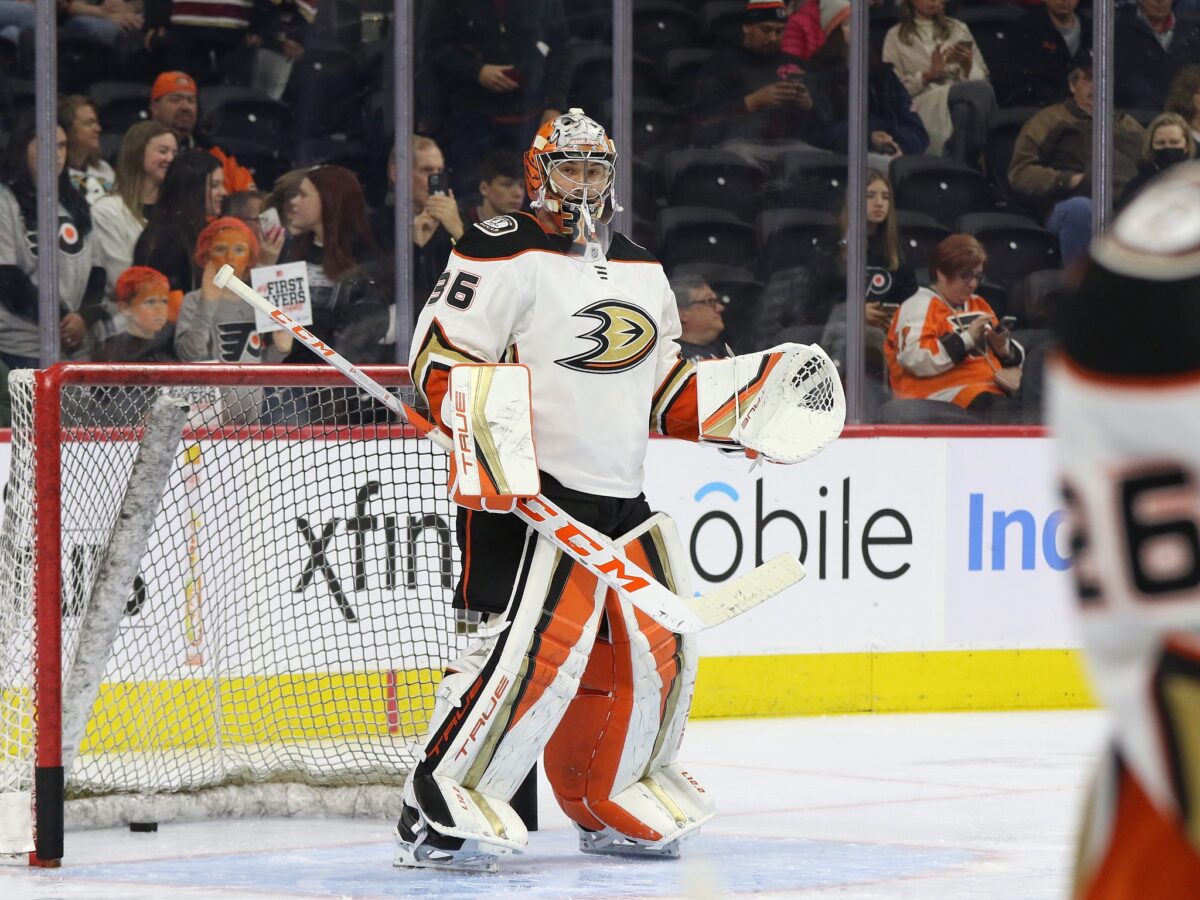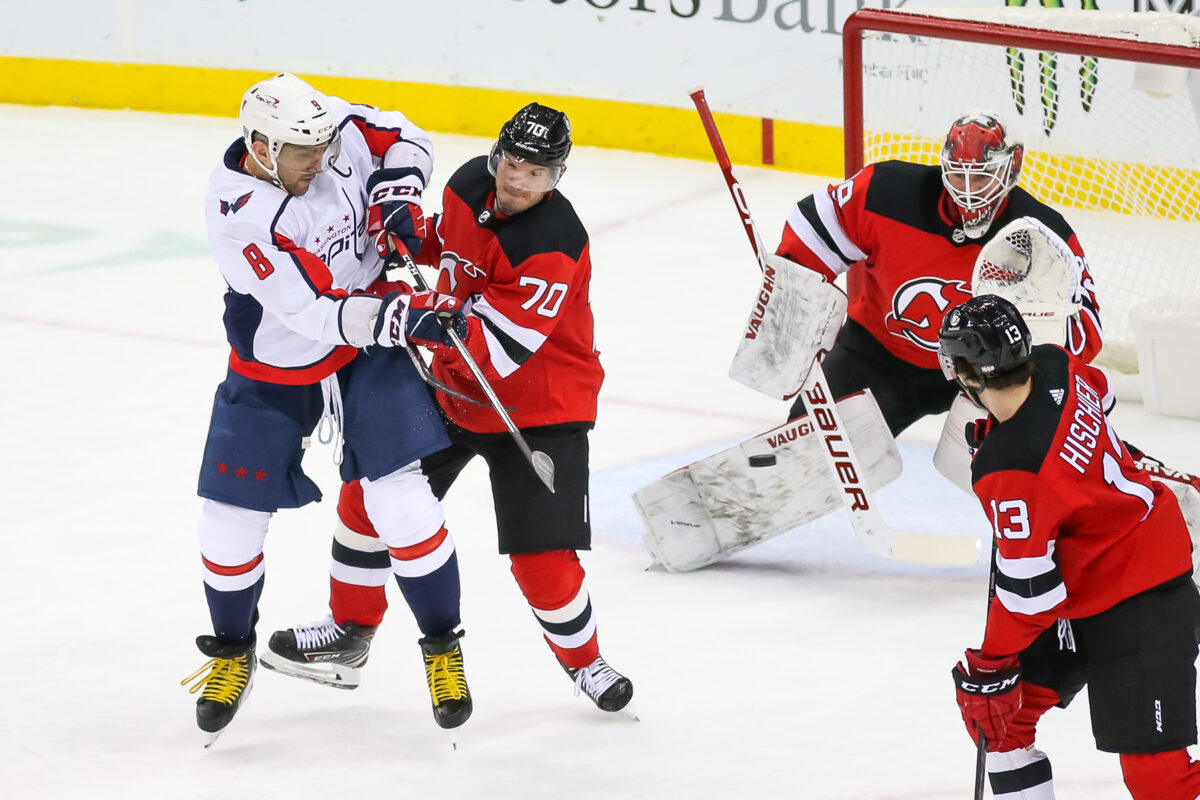It doesn’t make sense for the Washington Capitals to acquire John Gibson from the Anaheim Ducks. Despite the organisation’s desire for a shake-up between the pipes, trading for the 6-foot-2 netminder would be a misstep on the part of general manager Brian MacLellan.
Washington’s weaknesses in net are well-documented. Ilya Samsonov and Vitek Vanecek have whiffed on opportunities to claim the starter’s job and are restricted free agents (RFAs) this summer.
At least one of MacLellan’s RFA goaltenders will likely be dealt this offseason, building on the pursuit of an “obvious upgrade” to his tandem at the trade deadline. As a result, the Capitals are linked with a catalogue of netminders, including Gibson, who denied Nick Alberga’s report that he’s “open to being dealt” from Anaheim earlier this week.
Despite the 28-year-old’s swift rebuttal, he’s still generating plenty of trade talk and could still be moved by the rebuilding Ducks. However, acquiring him this offseason would be a mistake for Washington, and here are three reasons why.
Trading for John Gibson Would Be Too Expensive
Firstly, it’s worth remembering that elite netminders aren’t cheap to acquire. Despite putting up questionable numbers over the past couple of seasons, Gibson is still considered one of the NHL’s best puck stoppers and is an important player to the Ducks.
Anaheim general manager Pat Verbeek will be seeking a sizeable package in return for his star goalie, possibly including a first-round pick, promising NHLer, or top-end prospect. That’s steep, especially for an organisation approaching the end of its window to contend.

Speaking of which, Sportsnet’s Elliotte Friedman said: “My sense of what it is, is if the Ducks want to do something and it takes Gibson’s permission, they’ll just eventually go to him. I’m just not convinced yet that Verbeek sees trading Gibson as the right move for the team.”
For the Capitals to acquire Gibson, they would have to deal Vanecek or Samsonov, plus a skater they’re counting on to make an impact in the years ahead – potentially Connor McMichael or Hendrix Lapierre. It feels like a stretch and that’s before we consider the American’s contract.
Taking on John Gibson’s Contract Wouldn’t Be Smart
Gibson signed an eight-year contract worth $51.2 million ahead of the 2019-20 season, making his cap hit a cool $6.4 million through 2026-27. His deal also includes a modified no-trade clause.
There are three reasons why it wouldn’t be smart for the Capitals to take on Gibson’s contract, starting with the team’s lack of flexibility. MacLellan has just under $9 million in cap space at his disposal and still has to sign five players ahead of next season. Squeezing a big-ticket netminder onto his roster wouldn’t be straightforward, even if salary was retained on the other side of the deal.
Related: Capitals’ 2022 Offseason Free Agent Targets: Los Angeles Kings
Secondly, Gibson’s contract has another five years to run, at which point “Father Time” will have Alex Ovechkin beaten. If the Capitals aren’t in a position to fight for the Stanley Cup in 2027, should they be spending $6.4 million on their netminder? Possibly not.

It’s also worth pointing out that the American’s deal isn’t buyout friendly. He’ll still count for upwards of $2 million against the salary cap if bought out, with initial savings cancelled out by his long-term cost. In other words, the Capitals would be acquiring the worst years of a $6.4 million contract, just as their Cup window slams shut, if they make a move for the Pittsburgh-born goalie. It’d be a counterproductive move to make this summer.
John Gibson’s Recent Form is Concerning
Finally, a word on Gibson’s recent performances, which have taken a hit since the Ducks entered rebuild mode. It’s been three seasons since he last exceeded a .910 save percentage, ending 2021-22 with a sub-par .904 clip through 56 appearances. His goals-against average has also hovered around the 3.00 mark since 2019, albeit while playing behind a leaky defence.
That said, advanced stats tell a slightly different story. Gibson performed admirably against high-danger shots but was less impressive in other situations last term. It’s a head-scratcher.
Although there’s a strong chance Gibson’s numbers would rebound on a playoff team, he isn’t the home run acquisition many analysts might’ve considered him a couple of seasons ago. With that in mind, is he the “obvious upgrade” that Washington is looking for? Perhaps – but pulling the trigger on a trade would be an expensive gamble.
Capitals Must Fix Problems in Net Before Training Camp
Washington cannot afford to have another season defined by shaky netminding: their tandem was a major talking point during the regular season and bubbled up again during the playoffs. It’s an untenable position and the Capital must fix it.
Speaking at his end-of-year media availability, MacLellan said: “We’ve got to make a decision on what to do [in goal] and [how to] fit it under the cap.” Pressed on whether he’d like to add an experienced netminder to replace Vanecek or Samsonov, he added: “We’re going to explore it. I don’t know if it’s a deep market, we’ll talk to other teams and evaluate.”
MacLellan has two debates to settle before the draft:
- Should he extend his more consistent RFA, Vanecek, or the one with a higher ceiling, Samsonov?
- If he opts to trade for a netminder, what assets is he willing to send in the opposite direction?
It remains to be seen whether the Capitals will bet on Gibson. Either way, change is coming in the crease regardless.